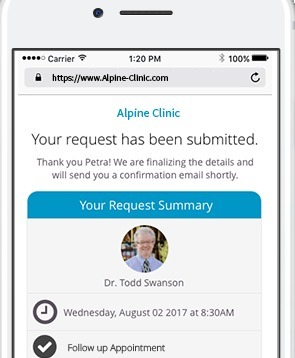por
Lauren Dubinsky, Senior Reporter | February 22, 2018

Solutionreach's SR Schedule
The patient relationship management company Solutionreach announced on Tuesday that it has joined GE Healthcare’s Centricity Partner Program.
"We are always working to build stronger relationships with these vendors and create long-term partnerships that allow us to better serve our joint customers," Jim Higgins, CEO of Solutionreach, told HCB News. "GE Centricity has [such] a strong presence in the ambulatory care market, which is an area where we are experiencing a lot of growth, that we felt it was important to create a lasting partnership with them."
The Centricity Partner Program is an opportunity for independent software vendors, system integrators, value-added resellers service providers and technology partners to complement GE’s digital solutions. To date, 19 companies are members of the program including M*Modal, Medfusion, and HealthGrid.
Solutionreach has been integrated with GE’s Centricity Practice Solution, which is a practice management system for ambulatory care. This joint solution will allow providers to connect with patients more easily by sending phone, email and text reminders, re-care communications, surveys and newsletters.
The company supports more than 100,000 health care professionals at about 25,000 practices, and reaches over 80 million patients nationally. The partnership with GE will also make the implementation process easier for practices that purchase Solutionreach products such as SR Conversations and SR Schedule.
SR Conversations allows for two-way messaging between patients and clinicians, and SR Schedule is an online self-scheduling tool that integrates with a practice’s practice management. Both tools help to improve the patient and provider relationship, which is more important than ever in the era of value-based care.
In 2017, Solutionreach conducted its Patient-Provider Relationship Study, which looked at patient satisfaction and switching behavior. The survey found that about one in eight patients left their primary care provider in the past year and one in three are considering a switch in the next few years.
Of those who left, 37 percent reported that it was due to a bad experience. Four of the most common reasons they gave were poor communication, difficulty scheduling and wait times, bad experience with office staff, and feeling more like a number than a person.
"Practices have an opportunity to easily fix these issues by making improvements to the way they interact with patients using digital solutions," said Higgins. "Technology can make scheduling easier, provide preference-based, personalized communication, and reduce staff workflow so they can focus more on the patient experience."
Back to HCB News
